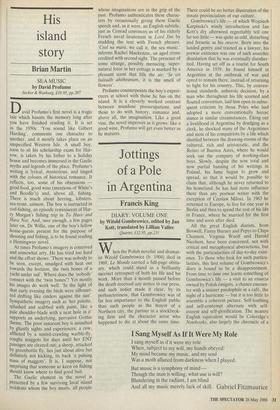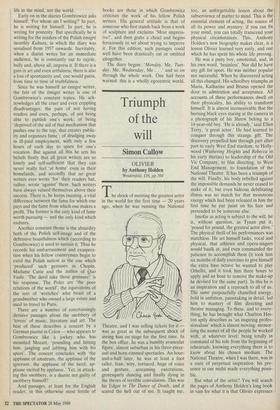Jottings of a Pole in Argentina
Francis King
DIARY: VOLUME ONE by Witold Gombrowicz, edited by Jan Kott, translated by Lillian Vallee
Quartet, f12.95, pp.231
When the Polish novelist and dramat- ist Witold Gombrowicz (b. 1904) died in 1969, Le Monde carried a full-page obitu- ary, which could stand as a brilliantly succinct retrospect of both his life and his work. More than a month passed before the death received any notice in our press, and such notice made it clear, by its perfunctoriness, that Gombrowicz was of far less importance to the English public than such people as the mayor of a Northern city, the partner in a stockbrok- ing firm and the character actor who happened to die at about the same time.
There could be no better illustration of the innate provincialism of our culture.
Gombrowicz's life — of which Wojciech Karpinski's windy introduction and Jan Kott's dry afterword regrettably tell one far too little — was quite as odd, disturbing and frenetic as his oeuvre. Born into the landed gentry and trained as a lawyer, his prewar existence was one of such anarchic dissolution that he was eventually disinher- ited. Having set off as a tourist for South America in 1939, he found himself in Argentina at the outbreak of war and opted to remain there, instead of returning to fight for his country. This, by conven- tional standards, unheroic decision, by a man who throughout his life scorned and flouted convention, laid him open to subse- quent criticism by those Poles who had adopted a more conventionally heroic stance in similar circumstances. Eking out a livelihood in Argentina by drudging as a clerk, he shocked many of the Argentines and most of his compatriots by a life which shuttled between the drawing-rooms of the cultured, rich and aristocratic, and the Retiro of Buenos Aires, where he would seek out the company of working-class boys. Slowly, despite the now total and now partial banning of his writings in Poland, his fame began to grow and spread, so that it would be possible to claim that, although he never returned to his homeland, he has had more influence there than any postwar writer with the exception of Czeslaw Milosz. In 1963 he returned to Europe, to live for one year in Berlin and then to spend the rest of his life in France, where he married for the first time and soon after died.
All the great English diarists, from Boswell, Fanny Burney and Pepys to Chips Channon, Virginia Woolf and Harold Nicolson, have been concerned, not with critical and metaphysical abstractions, but with the particularities of day-to-day exist- ence. To those who look for such particu- larities, this first volume of Gombrowicz's diary is bound to be a disappointment. From time to time one learns something of Gombrowicz's life — a visit to an estanza owned by Polish émigrés, a chance encoun- ter with a sinister paedophile in a café, the night of a hurricane — but it is too little to assemble a coherent picture. Self-loathing and self-contempt alternate with self- esteem and self-glorification. The nearest English equivalent would be Coleridge's Notebooks, also largely the chronicle of a
life in the mind, not the world.
Early on in the diaries Gombrowicz asks himself: 'For whom am I writing?' In part, he is writing for himself. In part, he is writing for posterity. But specifically he is writing for the readers of the Polish émigré monthly Kultura, in which the diary was serialised from 1957 onwards. Inevitably, when a diarist writes for an immediate audience, he is constantly out to cajole, bully and, above all, impress it. If there is a gain in art and even artfulness, there is also a loss of spontaneity and, one would guess, from time to time of truthfulness.
Since he was himself an émigré writer, the fate of the émigré writer is one of Gombrowicz's constant topics. He ack- nowledges all the cruel and even crippling disadvantages: the pain of not having readers and even, perhaps, of not being able to publish one's work; of being 'deprived of the aid of that mechanism that pushes one to the top, that creates public- ity and organises fame'; of drudging away in ill-paid employment, with only a few hours of each day to spare for one's vocation. But against all this he sets his beliefs firstly that all great writers are so lonely and self-sufficient that they can never really feel 'at home' even in their homelands, and secondly that no great writers ever wrote 'for' their readers but, rather, wrote 'against' them. Such writers have always valued themselves above their success. There is, he keeps insisting, a vital difference between the fame for which one pays and the fame from which one makes a profit. The former is the only kind of fame worth pursuing — and the only kind which endures.
Another constant theme is the absurdity both of the Polish self-image and of the defensive boastfulness which (according to Gombrowicz) is used to sustain it. Thus he records his embarrassment and exaspera- tion when his fellow countrymen begin to extol the Polish nation as the one which 'produced' such geniuses as Chopin, Madame Curie and the author of Quo Vadis. 'The devil take those geniuses!' is his response. The Poles are 'the poor relations of the world', the equivalents of the sort of 'wretches' who boast of a grandmother who owned a large estate and used to travel to Paris.
There are a number of entertainingly derisive passages about the snobbery of 'lovers' of music, literature and art. The best of these describes a concert by a German pianist in Colon — who appears to Gombrowicz like a jockey who has mounted Mozart, 'pounding and hitting him, jangling and jabbing him with his spurs'. The concert concludes with 'the applause of amateurs, the applause of the ignorant, the applause of the herd, ap- plause incited by applause.' Yet, in attack- ing this snobbery, is a diarist not guilty of snobbery himself?
Arid passages, at least for the English reader, in this otherwise most fertile of books are those in which Gombrowicz criticises the work of his fellow Polish writers. His general attitude is that of someone who first stands back from a work of sculpture and exclaims 'Most impress- ive!', and then grabs a chisel and begins ferociously to set about trying to improve it. For this edition, such passages could well have been drastically cut or omitted altogether.
The diary begins: 'Monday, Me, Tues- day, Me, Wednesday, Me . . .' and so on through the whole week. One had been warned: this is a wholly egocentric world.



















































 Previous page
Previous page